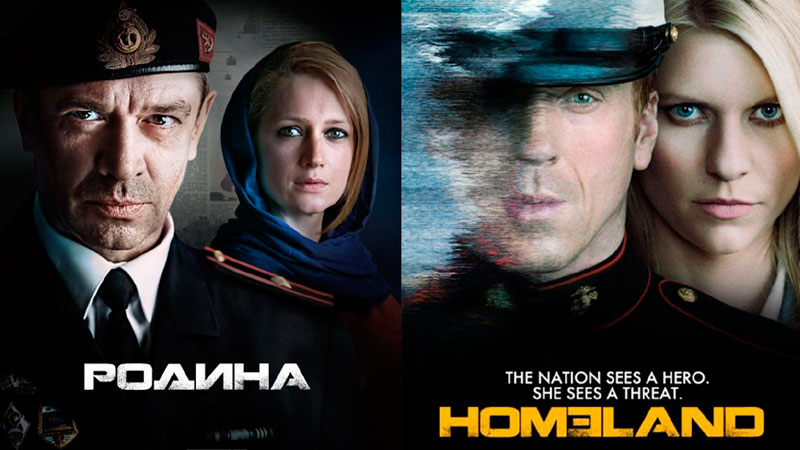
Russia's new TV series “Rodina” (left) and the US hit show “Homeland” (right). Image courtesy of TJournal.ru.
What follows is a full English-language translation of an article by Vadim Elistratov that appeared in Russian on the website TJournal on March 17, 2015.
A new Russian TV series called Rodina (“Homeland”) premiered on March 16 on the national TV network Rossiya-1. Directed by Pavel Lungin, the new series is based on the Israeli show Prisoners of War, which is also the basis for the hit American television drama Homeland.
TJ’s Vadim Elistratov watched the first episode and explains why it’s hard to dismiss the Russian adaptation as a failure, though its creators are clearly afraid of deviating too much from the original material, and the Russian series suffers as a result.
‘Homeland’ vs. ‘Homeland’ by Vadim Elistratov
Russian fans of Homeland, which has become one of the major TV dramas of the last four years (winning critical acclaim and six Emmys), reacted with hostility to the announcement of a Russian adaptation, but news that director Pavel Lungin [Taxi Blues, The Island, Tsar] and high-caliber actors like Vladimir Mashkov [Tycoon, Mission: Impossible – Ghost Protocol] and Vladimir Vdovichenkov [Leviathan] had joined the project gave some hope that the show at least wouldn’t be an embarrassment.
Now that the first episode has premiered, we know the show isn’t a disaster. But the creators are being a tad misleading when they cite the Israeli original, Prisoners of War, as source material: the first episode of Rodina is basically a frame-by-frame reproduction of the American show, and connections to the Israeli series (for which Rossiya-1 bought the legal rights) are weak.
Prisoners of War tells the story of two Israeli POWs returned home after 17 years in Syrian captivity, and their difficult time adjusting to normal life. The US show shifts the focus of the plot to spy intrigues: only one soldier, Nicholas Brody, survives enemy captivity, and he immediately attracts the attention of CIA agent Carrie Mathison. She alone suspects the “war hero” of being a double agent, turned by his terrorist captors and sent back to America to carry out an attack on US soil.
Rodina is patterned on Homeland in minute detail, though Lungin’s adaptation is of course less explicit than the US show, which airs on premium cable. The Russian show’s writers left in the sex scenes that are vital to the plot, but there are several noticeable redactions. For example, the Mrs. Brody character in Rodina walks in on her daughter trying to kiss a boy, not her smoking marijuana with a friend.

“Homeland” (top) and “Rodina” (bottom). TJournal.ru.

“Homeland” (top) and “Rodina” (bottom). TJournal.ru.
Also missing from the Russian premiere is the scene where the Carrie Mathison character starts dolling herself up to go out clubbing, with plans of sleeping with the first man she meets. In the US series, this scene was necessary to show that Carrie is so absorbed in her work that her relationships with men are purely functional. It’s unclear why the Russian show’s writers removed this bit.

“Homeland” (top) and “Rodina” (bottom). TJournal.ru.
Lungin also weakens Rodina’s realism by setting it in 1999. The main characters constantly use mobile phones, they install miniature hidden cameras in the suspected terrorist’s apartment, and they generally ignore every aspect of the timeframe chosen for the show. The reasons for picking 1999 are obvious: it was easier then to imagine a major terrorist attack on the Russian heartland, but this nuance is clearly no excuse for the show’s many historical inaccuracies.

“Homeland” (top) and “Rodina” (bottom). TJournal.ru.

“Homeland” (top) and “Rodina” (bottom). TJournal.ru.

“Homeland” (top) and “Rodina” (bottom). TJournal.ru.
Despite some changes, Rodina was clearly made with the fear that writers might break something that already works, and so the Russian creators even went to great efforts to make sure the actors starring in their adaptation resembled their counterparts on the American series. On the one hand, this approach works: Lungin has made a show that’s paced just as well as the US version. On the other hand, however, the show so far looks mostly like an unnecessary, forced Russification that likely appeals only to viewers who refuse to watch American TV for some ideological reason.
From a technical standpoint, Rodina is inferior to Homeland in every way: its cinematography, music, and production costs.
But Homeland didn’t get to be so popular for its cinematography—it was its storyline, its good acting (and here you can count on Mashkov to deliver), and the series’ capacity to portray the lives of intelligence agents in moral shades of grey. The show’s creators frequently make viewers feel uncomfortable, confronting them with images of the brutality of intelligence agents and, from time to time, encouraging them to sympathize with terrorists and their families. Lungin’s adaptation will gain significance, if he’s able to address these issues, though it would be something unprecedented for Russian prime-time television.

“Homeland” (top) and “Rodina” (bottom). TJournal.ru.
For now, there’s only one reason to watch Rodina: to notice the interesting differences in the mentalities of Americans and Russians. The subtle distinctions speak volumes. For example, the Nicholas Brody character, standing in front of the US Capitol building, seems like a genuine threat, but in the same scene in Rodina, his Russian counterpart, standing in view of the Kremlin, looks positively harmless.









1 comment